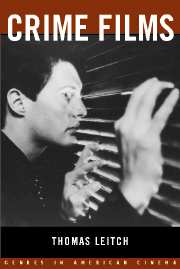Book contents
- Frontmatter
- Contents
- List of Illustrations
- Acknowledgments
- 1 The Problem of the Crime Film
- 2 Historical and Cultural Overview
- 3 Critical Overview
- 4 Fury and the Victim Film
- 5 The Godfather and the Gangster Film
- 6 Double Indemnity and the Film Noir
- 7 Basic Instinct and the Erotic Thriller
- 8 Murder on the Orient Express, Blue Velvet, and the Unofficial-Detective Film
- 9 Chinatown and the Private-Eye Film
- 10 Bullitt and the Police Film
- 11 Reversal of Fortune and the Lawyer Film
- 12 Fargo and the Crime Comedy
- 13 Conclusion: What Good Are Crime Films?
- Notes
- Selected Bibliography
- Filmography/Videography
- Index
3 - Critical Overview
Published online by Cambridge University Press: 27 October 2009
- Frontmatter
- Contents
- List of Illustrations
- Acknowledgments
- 1 The Problem of the Crime Film
- 2 Historical and Cultural Overview
- 3 Critical Overview
- 4 Fury and the Victim Film
- 5 The Godfather and the Gangster Film
- 6 Double Indemnity and the Film Noir
- 7 Basic Instinct and the Erotic Thriller
- 8 Murder on the Orient Express, Blue Velvet, and the Unofficial-Detective Film
- 9 Chinatown and the Private-Eye Film
- 10 Bullitt and the Police Film
- 11 Reversal of Fortune and the Lawyer Film
- 12 Fargo and the Crime Comedy
- 13 Conclusion: What Good Are Crime Films?
- Notes
- Selected Bibliography
- Filmography/Videography
- Index
Summary
Like comedies, westerns, horror films, and science fiction, the crime film has inspired dozens of volumes of critical commentary. It is difficult to write a coherent history of criticism of the crime film, however, especially because of its tendency to split into subgenres whose import is apparently only distantly related. The project of genre theory itself has depended throughout its history on the ascendancy of such critical methodologies as the structuralism of Tzvetan Todorov, which allows the systematic analysis of generic conventions, and the revisionist historicism of Rick Altman, which uncovers economic motives for the rise and fall of specific Hollywood genres. In the same way, critical responses to the crime film and its numerous subgenres have divided according to which modes of academic criticism have been fashionable from moment to moment: auteur criticism, mise-en-scène criticism, thematic criticism, structural criticism, psychoanalytic criticism, economic criticism, critical interrogations of race or gender or identity politics. Overlaid on these categories, however, is a different, surprisingly rigid series of categories dictated by the different crime subgenres themselves. The gangster film, the first crime subgenre to provoke serious commentary, tends to generate discussions of Hollywood mythmaking. Though this thematic strand continues in discussions of film noir, it is complemented by an equally strong thread of mise-en-scène criticism.
- Type
- Chapter
- Information
- Crime Films , pp. 52 - 78Publisher: Cambridge University PressPrint publication year: 2002

